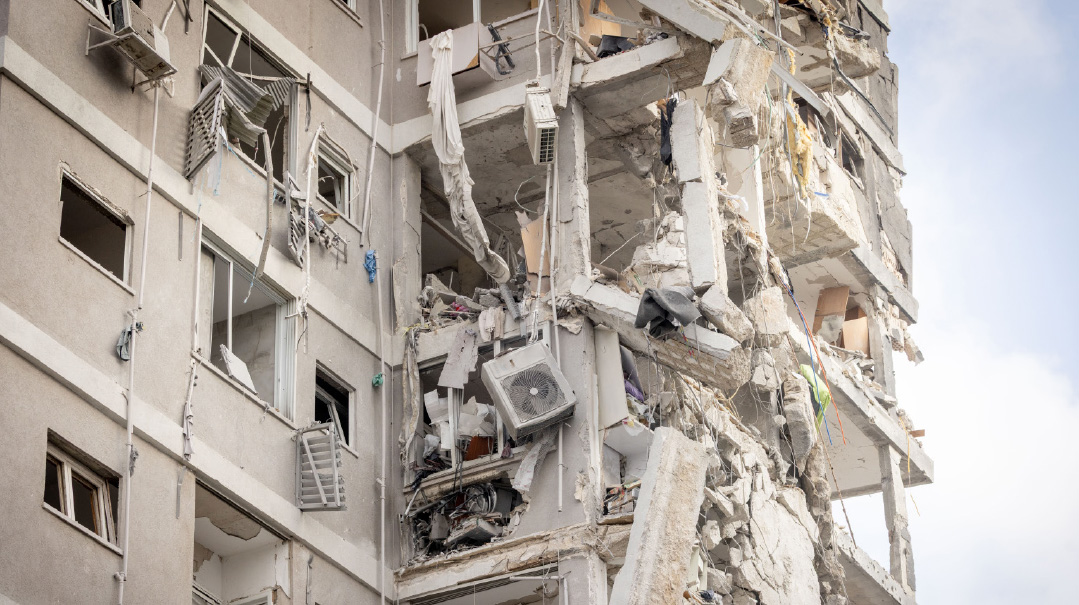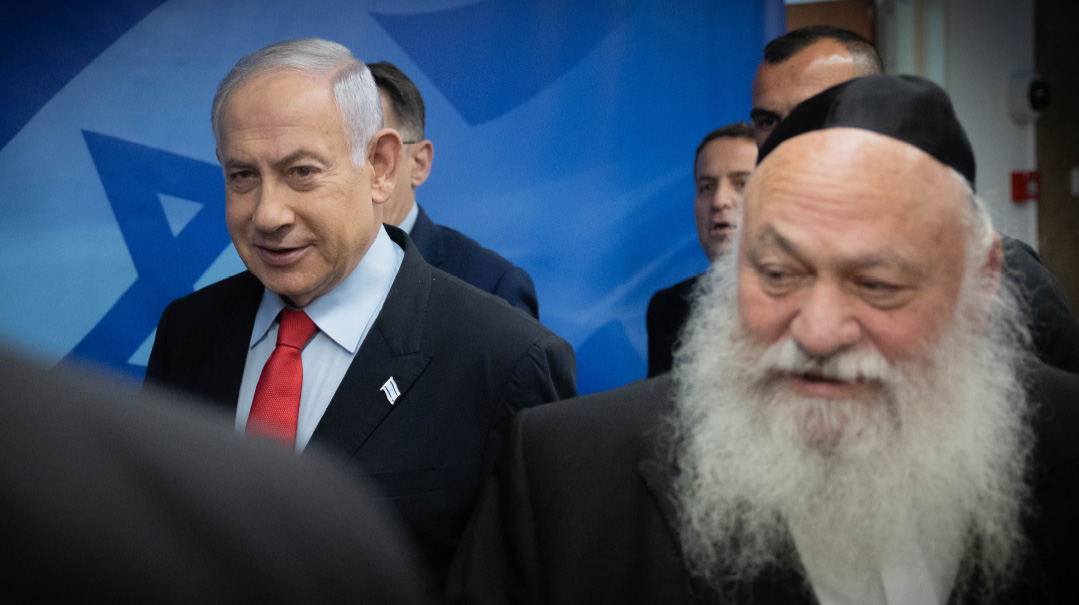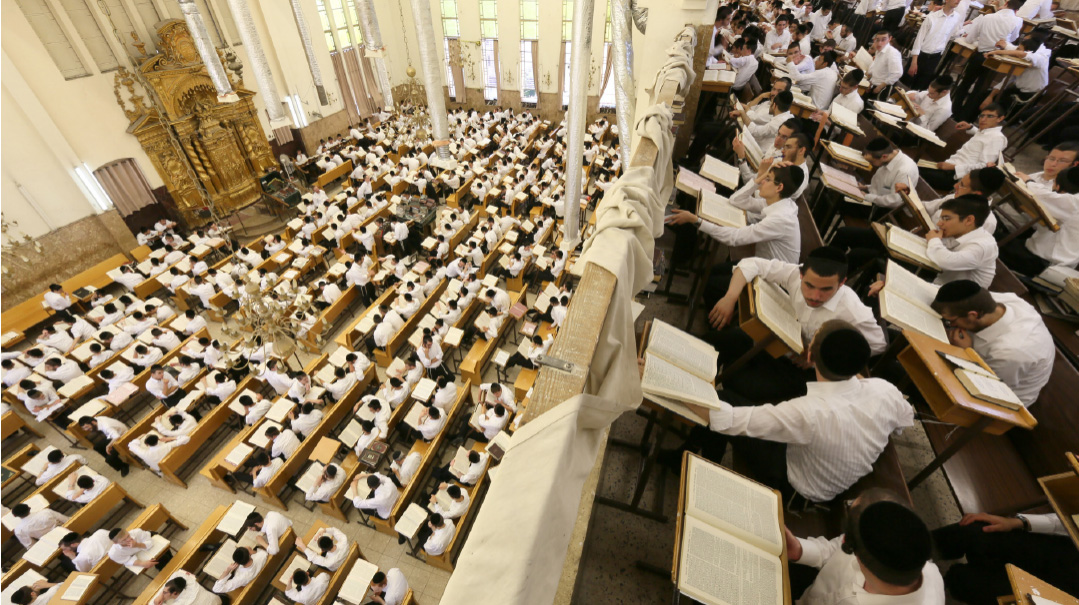Battle for the Left

Lapid and Gantz duel for leadership of the Left

The center-left’s co-leaders for three elections in a row have become the bitterest rivals in Israeli politics. In the current campaign, both Yair Lapid and Benny Gantz are angling for undisputed leadership of the bloc.
For three elections, Gantz led the Blue and White alliance and the left-wing bloc, while Lapid played the part of the loyal soldier. But this time, Private Lapid is taking the former chief of staff and decorated general to school.
Yair Lapid started the campaign from the enviable position of incumbent prime minister. The prevailing wisdom in the political world held that Lapid would avoid rocking the boat before the election, to accustom voters to hearing the words “Prime Minister Yair Lapid” without instinctively face-palming in alarm.
But last week, Lapid deviated from the levelheaded policy of his two predecessors with his decision to openly back Ukraine over Russia, rousing the Russian bear to an immediate response: the closing of the Jewish Agency’s offices in Russia.
Opposition leader Binyamin Netanyahu was quick to condemn Lapid’s hubris and impulsiveness, but the prime minister, in damage control mode on the diplomatic front, has no regrets politically.
“If we sit with folded arms and do nothing, the title will be utterly meaningless,” Lapid told aides last week, citing his predecessor Naftali Bennett — who had to retire shamefaced from politics after alienating his own base — as a cautionary tale. Bennett, by the way, has been avoiding the cameras as assiduously as he courted them while in office.
The Tel Avivian Lapid sees himself as having a place of honor in the fraternity of progressive Western leaders including France’s Macron, Canada’s Trudeau, and congressional Democrats (compared to whom Biden is a flag-waving conservative) in the US. Lapid’s move was aimed at left-wing voters who embrace Western talking points against Moscow.
There’s nothing like a good anecdote to drive home the significance of Lapid’s departure from Netanyahu’s policy (which was continued by Bennett). When I accompanied Netanyahu on his visit to Trump in February 2020, Bibi surprised the entourage on the way back with a connecting flight to Moscow.
Back on the plane from Moscow to Jerusalem, a “senior political figure,” whom Bibi humorously asked us to refer to as “the man in the red tie,” explained the rationale for the stopover: “To preserve our freedom of action, you have to maneuver between the powers. When the prime minister of Israel and Arab leaders gather in the White House, the Russians feel pressured. My trip to Moscow makes clear to the Russians that despite the special relationship between Israel and the United States, we aren’t taking steps behind Russia’s back and we see them as a major actor.”
The towering defense minister, Benny Gantz (he stands 6 feet, 2 inches), has paid a heavy price for teaming up with Justice Minister Gideon Saar, a leading Likud figure who bolted from the party to become one of the architects of the “change government.”
Gantz’s rationale was to signal to the center-left bloc that while Lapid may be the interim prime minister, Gantz is the one who has the best chances of becoming prime minister after the elections.
But for now, Israeli voters don’t seem too keen on the joint offering. Ever since the merger, the dual party has only declined in the polls.
Last week, fresh off a work trip to America, Gantz went on a blitz of TV interviews to plead his case as the only center-left leader with a realistic shot at forming a government. His trump card? The close relationship he has cultivated with the chareidim over the years.
Gantz explained that his ties with the chareidim will enable him to form a government. But this may be a case of the groom announcing the wedding date before securing the bride’s consent. This week, the chareidim characterized Gantz as delusional. Shas chairman Aryeh Deri led the charge.
“With all due respect to Gantz — and he is a very decent and likable individual — he needs to understand the lesson of the Bennett government’s flop: a prime minister with a handful of seats simply can’t govern, and those who would pay the price for this are the State of Israel and its citizens,” Deri said. “After the elections, G-d willing, we’ll put forward legislation requiring that a candidate for prime minister has to receive 15 percent of the vote, or 18 seats.”
Ironically, it’s the chareidim, who for so long have been slandered as extortionist by the left, who are now taking a stand against the left’s political extortionist.
Not long after Barak Obama took office in 2009, I accompanied then-US ambassador Joe Cunningham on a tour of chareidi Jerusalem. The itinerary took him to the humble abode of Rav Yosef Shalom Elyashiv ztz”l, who was flanked by his longtime confidant Rav Yosef Efrati and Yitzchak Pindrus — now an MK, but there in the capacity of translator at the time.
Ambassador Cunningham entered the room accompanied by a team of embassy photographers, brought along with him in hopes of capturing a repeat performance. On a visit to Rav Elyashiv by the previous ambassador, Richard Jones — an appointee of Obama’s predecessor, George W. Bush — something remarkable happened, and there was no photographic record of the event. The State Department was determined with Cunningham’s visit not to be caught flat-footed this time.
Ambassador Jones, the Bush appointee, had received a warm blessing from Rav Elyashiv. The posek hador called the American administration that Jones represented a “malchus shel chesed” and requested that the United States government aid the people of Israel against grave security threats in general and against the Iranian threat in particular.
Jones hadn’t brought photographers on that visit, assuming that it would be nothing but a courtesy call. When Cunningham visited as Obama’s representative several years later, the ambassador’s team brought along a gaggle of photographers to record every word, in the expectation that Rav Elyashiv would give them the same enthusiastic reception.
But this time the diplomats would be disappointed. Rav Elyashiv remained almost completely silent during the meeting and refrained from blessing his guest. The ambassador’s team assumed that Rav Elyashiv’s reticence was due to the crowd of photographers and left disappointed, but not insulted.
Only when the envoy and his entourage were gone did the gadol hador reveal the reason for his silence.
“To the emissary of Bush, the previous president, who was an oheiv Yisrael, I could say that his country was a malchus shel chesed,” he replied. “But how can I bless President Obama? Who knows if he’ll help or harm Israel?”
Rav Elyashiv’s doubts, of course, were well-founded, as we see in retrospect. Even as we mark a decade since his passing, we see how the situation has deteriorated. Now Israel’s prime minister speaks hubristically, making sweeping condemnations of world powers instead of choosing his words carefully. This is the face of the current Israeli government under Lapid: undisciplined and tactless. Rav Elyashiv’s guidance is missed more than ever. —
(Originally featured in Mishpacha, Issue 922)
Oops! We could not locate your form.







